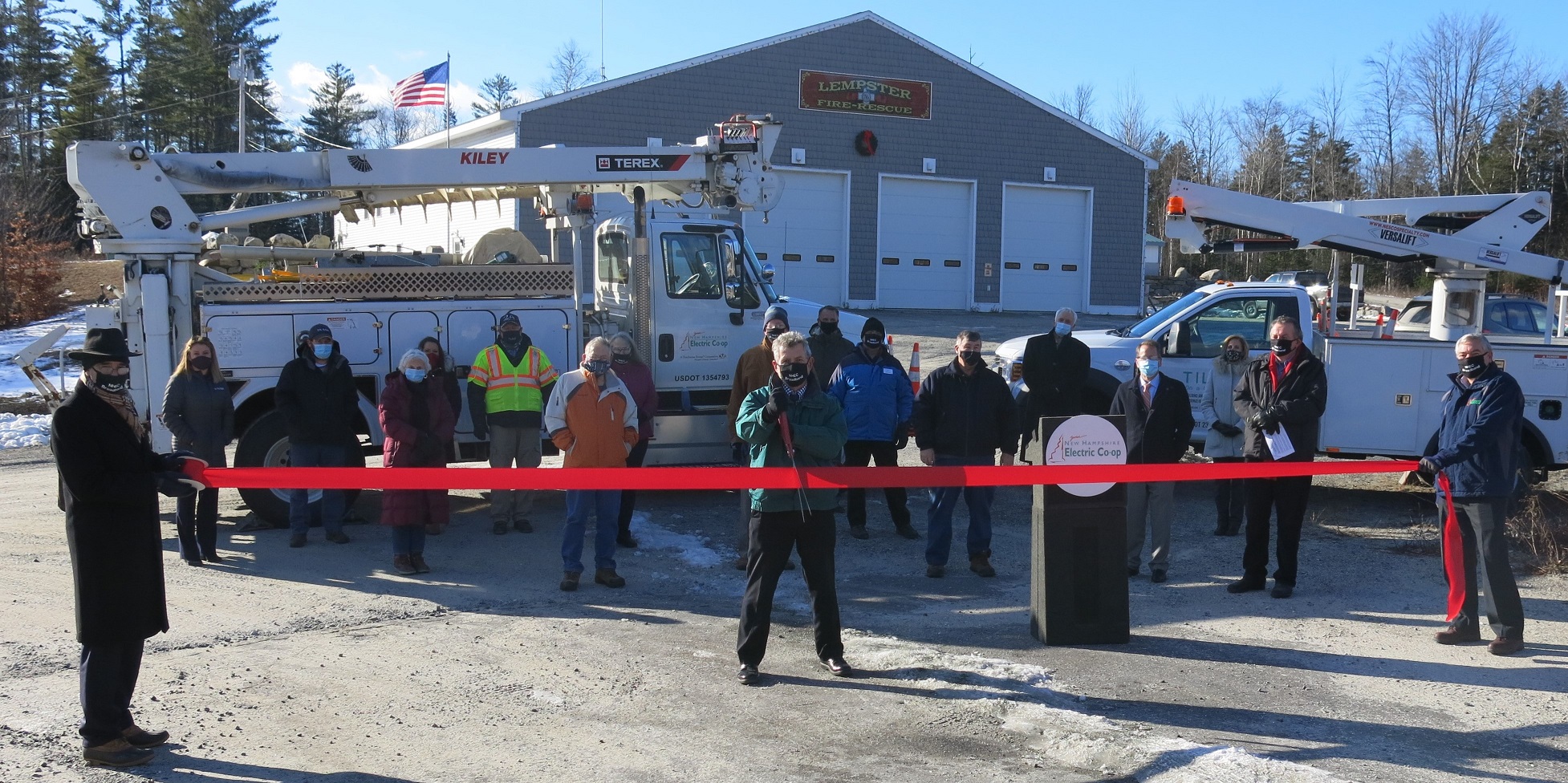LEMPSTER, NH – In the same town where eighty-one years ago New Hampshire Electric Cooperative (NHEC) began its mission to electrify rural New Hampshire, a small gathering of Co-op officials and guests marked the start of a new essential service being provided by NHEC – broadband Internet.
Thanks to the rapid construction of two fiber optic networks, nearly 900 NHEC members in four towns – Lempster, Clarksville, Colebrook and Stewartstown – now have access to high-speed Internet, that will provide service at upload/download speeds as high as 1 gigabit per second.
These initial broadband projects were supported by a $6.7 million grant from the State’s Connecting New Hampshire Emergency Broadband Program, and are the Co-op’s first steps towards its goal of ensuring all its members have access to the high-speed Internet service they need.
“I would like to thank the New Hampshire Electric Cooperative for partnering with the State to bring broadband to the communities of Colebrook, Clarksville, Stewartstown and Lempster. Nearly 900 homes and businesses will now have access to high-speed internet. My administration will continue to pursue opportunities to connect underserved communities in our State,” said New Hampshire Governor Chris Sununu in a written statement.
U.S. Senator Jeanne Shaheen noted NHEC’s history in a statement delivered to the Co-op Board of Directors and staff.
“Echoing the importance of rural electrification 80 years ago, broadband internet is similarly an essential driver of economic development and competitiveness. From its first pole set in Lempster in 1939 to right now, the New Hampshire Electric Cooperative has brought the future to its members. This bold venture is crucial for telemedicine, virtual learning and the online business activity so vital during the COVID-19 pandemic,” Shaheen wrote.
Joining NHEC and town officials, business partners and supporters at the December 15 outdoor gathering was Frank Edelblut, Commissioner of the New Hampshire Department of Education, who emphasized the critical importance of broadband Internet to New Hampshire students, many of whom are struggling in the absence of broadband service to keep up with online schooling in the COVID-19 era.
“Projects like this are going to make an important difference for our communities, and particularly our rural communities,” Edelblut said. “By bringing high-speed, high-capacity Internet into these communities, what we’ve really done is open up opportunities for the citizens and students of New Hampshire. Not only are they able to find more efficient, effective ways to access their education, we are opening up worlds to them through access to high-speed broadband Internet.”
Philip Tirrell, Chairman of the Lempster Board of Selectmen, stressed the importance of Internet connectivity to residents of rural Sullivan and Coos counties where the first NHEC members are receiving service.
“This year has been a change for the entire country,” he said. “Our students are working remotely every Wednesday, many of them without adequate internet coverage, and having a difficult time trying to participate…so today is historic for us. It will help launch us into everything this town needs for the future.”
NHEC Board Chair Tom Mongeon welcomed the arrival of broadband service as a “historic milestone” for members, who like their predecessors in 1939, had been bypassed for service by the existing providers. He also commended NHEC members for engaging with their cooperative and letting the Board know that they wanted NHEC to do more to provide broadband access.
“Our members are at the heart of all that we do as a cooperative and we would not be here today without your continued encouragement for us to do more to provide this essential service,” Mongeon said. “We hope you’ll continue to make your voice heard.”
The completion of NHEC’s initial broadband project required the cooperation and support of numerous partners, all of whom worked under tight deadlines to have service available to members before December 15, 2020, as required by the terms of the state of NH grant. NHEC President/CEO Steve Camerino cited the efforts of Tilson Tech, as well as Mission Broadband, Granite State Communications, and the National Rural Telecommunications Cooperative as key to the project’s success.
“Bringing this project from conception to completion in only six months was an incredible feat, and took the herculean efforts of an entire team,” Camerino said.
NHEC Broadband Executive Robert Cruickshank, hired recently to manage the Co-op’s broadband efforts, said NHEC would be working closely with towns, the state and federal government, contractors, and existing telecommunications providers as it builds out its broadband service. He said NHEC will continue to seek out federal and state funding for construction and praised the efforts of town governments and broadband advisory committees, many of whom have been advocating for increased access to broadband Internet for years.
“Our entry into broadband Internet isn’t just good news, it’s essential news, especially as we ramp down from all the pandemic activities that have kept us so cloistered. Broadband clearly is a service that’s on par with electricity and water, and we’re proud to be able to bring that to our communities,” said Cruickshank.
Eighty-one years ago this month, a newspaper account reported the festivities in Lempster that marked the start of NHEC’s electric service to rural New Hampshire. Leo Dwyer, NHEC Director and Chair of the Board’s Broadband Committee, noted that more than 300 people marched down Lempster Street to the beat of a 23-piece band to witness the setting of the first NHEC pole in a field belonging to dairyman and NHEC co-founder Fred Barton.
“It is only fitting that NHEC Broadband begins here in Lempster, as one day, in the not-too distant future, this new network will expand to be as widespread and integral to our rural communities as the electric system which grew from Fred’s field,” Dwyer said.
NHEC is a member-owned electric distribution cooperative serving 85,000 homes and businesses in 115 New Hampshire communities. To view a video of the December 15 event and for updates on NHEC’s broadband efforts please check our Broadband page.
